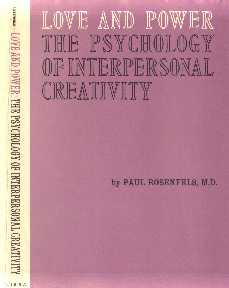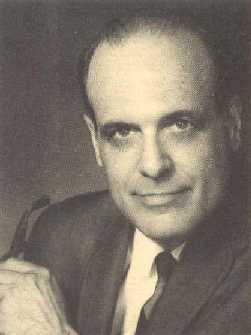|
|
The Ninth Street Center
Our Publications |

|
Love and Power: The Psychology of Interpersonal Creativity [1966] by Paul Rosenfels |
I first met Paul in August, 1966. I was a 20-year-old college student and he was a 57-year-old psychiatrist living in a brownstone in Greenwich Village. I was working that summer as a file clerk for an ad agency and Sam, a young co-worker, had started raving about this shrink he was seeing.
"He's amazing! He's not like a shrink, he's a real mensch. And he likes young people like us, even if you have long hair. Even if you smoke grass!"
I was interested in psychiatry. It had become clear to me that we humans don't know what we're doing. I had seen plenty of irrational suffering by then, and all my attempts to help people had gone nowhere, as had my attempts to help myself when this interpersonal ineffectuality got me down. I had once asked my father about the usefulness of psychology and he had shaken his head sadly and said, "It's not a science yet."
How close were shrinks getting to solving the frustrating paradoxes of human neurosis? I had to find out. What qualified Paul to be a useful test case, besides his liking us young rebels, was that he charged as low as $5 an hour if that's all you could afford. I had already test-driven two shrinks at college, one of whom was benevolent but ineffectual, and the other of whom was definitely malevolent but ineffectual.
When Paul asked me why I had come to see him, I said that I was thinking of becoming a psychiatrist and just wanted to see what it was like. "Well, already I can tell you that you're more honest than most of them," he said. No impersonal formality here! I asked him which school of psychology he followed. (Funny, how many patients forget to ask this all-important question.) He smiled and said, "My own." A guy who wasn't afraid to be original! So far, Paul was passing all my tests. Sometime during that hour he said his second book had just been published. He reached into a big cardboard box, pulled out a copy, and autographed it for me.
My therapy over the next six weeks did not go well. He kept asking me about my interpretations of human behavior, but the only observations which had stayed with me were how much I had been betrayed by my sadistic father and how much I had been hurt by my high school friend Karl. His probings made me depressed, and being depressed made me stupid.
I was not prepared to give up, however. Paul was the first older man to take an interest in me, and represented a stepping stone to the larger world I had yearned for but not found at college.
It wasn't until I went back to school that I opened his book, Love and Power. It seemed like standard issue gobbledygook at first. But as I continued reading, several things stood out. First, I agreed with his descriptions of the positive motivations underlying human development. Growth for Paul was more about exploring emergent potential than settling for normalcy -- which as far as I was concerned was a euphemism for "lacking ambition" and "diseased to an average degree." Secondly, he took the time to say things that all of us know in a way that made it all make more sense than before. He explained psychological mechanisms in a more semantically disciplined and coherent fashion, something you'd want in a scientific system. Finally, his book seemed uncannily to describe me and my creative agenda in a way that Freud never could and that Jung had only intimated.
I knew I would have to see Paul again during the Christmas break.
The original dust jacket:
Here is a challenge to conventional, intuitive psychiatry
and psychoanalysis and a source of growth for those who would
reach for it -- whether professional or layman, student or scholar,
artist or businessman.

In his new book, Dr. Rosenfels links the historical philosophical search for wisdom in human affairs to the modern scientific tradition. Love and Power: The Psychology of Interpersonal Creativity introduces new clarity and organization into the scientific system first promulgated in
Psychoanalysis and Civilization
[1962]. It delineates the nature of the masculine and feminine psychological character and clearly separates these entities from any necessary dependence on biological gender. Having established the fact that civilized society needs both a creative surplus of love which only feminine character resources can bring, and a creative surplus of power which can come into being only through the free operation of the masculine ideal . . .
The capacity of Dr. Rosenfels' work to bring about revolutionary changes in man's understanding of man will be measured by the validity of his claim to have brought to the subject of human nature the first unity psychiatry has achieved. As the reader discovers this unity he will find himself in the presence of a vision of human nature which is wider and deeper than he has known before, giving new dimensions to the totality of life's experiences.
This is a handbook for creative living, to be used by those who have no other choice but to think and act independently, guided by their own honesty and courage.
[D:\dh\web\NSC\3\HTP\LAP.htp (65 lines) 2005-08-12 18:13 Dean Hannotte] | ||||||||